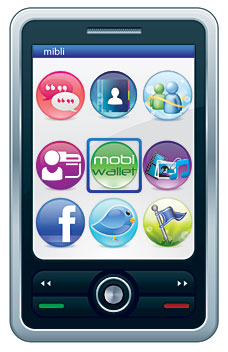Having distributed more than a billion operating systems in a little under two decades Microsoft was left with a problem; the number of new users able to access and afford their platform was dwindling despite the fact that the world’s population was growing.
Halfway around the world, South African firm, Blue Label Telecoms (BLT) was providing roughly 80% of SA pre-paid customers with airtime and growing their footprint in India, setting up commuter ticketing services. On the verge of listing BLT specialised, as Dr. David Fraser their chief technology officer put it, in “prepaid developing world customers”. BLT also faced a problem; people needed more convenient and secure ways of accessing services and performing transactions.
Shortly before BLT’s listing, Microsoft bought a 12% stake in the company and approached them with an idea that could solve both their problems.
 The launch of mibli
The launch of mibli
Fast forward 18 months and mibli, powered by Microsoft OneApp, a platform that enables basic handsets to run mobile apps like Twitter, Facebook and Windows Live Messenger, is officially launched in South Africa. Introduced by the Mobile Services Company (MSC), a wholly owned BLT firm, the platform is a world first, with a focus on developing markets. The fact that South Africa was “ground zero” for the development of OneApp, as Ian Puttergill of Microsoft SA puts it, is a reason for great pride as well.
South Africa is rather unique in that cellphone penetration is in excess of 80%, making it the ideal developing world mobile test market, with companies like Google also interested. The trouble with the majority of phones in SA is that they’re not smartphones, but basic handsets or “feature” phones.
The thing about mibli though is that it’s network and device agnostic. As long as the phone has a GPRS connection to the Internet and Java support, mibli will work on it. It’s consequently the users that are at the centre of the mibli service. Users can simply download mibli, at 151 Kb from www.mibli.com, to whatever handset there are using and sign-in with a username and password.
The beauty of this is that everything, including processing, happens in the cloud. This means that a handset is no longer the centre of a user’s mobile experience, but a gateway. It also means that the number of potential users is dependent only upon how many phones there are on the market; 4 billion worldwide according to the UN’s last estimate. Dr. Fraser estimates that approximately 80% of cellphones in our own country are currently capable of running mibli. To say that the platform has reach would be an understatement.
| mibli is: mibli powered by Microsoft OneApp, is a new software application that enables conventional cellphones to run mobile apps. Microsoft OneApp powers mibli by enabling a robust environment for building, deploying and publishing mobile apps and making them available to mibli users. |
It’s about access
Before the concept of digital was even invented, Thomas Jefferson said that, “Information is the currency of democracy”. While a powerful thought, Jefferson never had the opportunity to understand what access in a digital age could really mean. Going further than just accessing information, it’s about freely sharing information and even information creation.
Cheap communication via instant messaging, secure transactions via a mobile wallet, social networking and access to information in the form of news, educational, health and environmental apps, all from a cheap, basic handset has the potential to create a situation in which the next billion do have the opportunity to understand what information access, sharing and creation really means.
The news from MSC that an apps market for mibli is in the wings is even more exciting. An apps market with the scale to reach millions of people could create an entire mobile economy, empowering developers who can create vehicles for sharing information. As OneApp is powered in the cloud, and developers don’t have to develop across different platforms, development time and computing power needed to create apps are dramatically reduced.
“We’re confident that mibli will open up a world of opportunity and possibility for local consumers, advertisers, marketers and developers alike. We expect to create a wave of entrepreneurial opportunities and new businesses in South Africa, where mobile applications will ultimately become a viable industry all of its own,” says JJ Botha, CEO of MSC.
Today BLT is South Africa’s fastest growing telecoms company, a position it may well retain for some time to come if mibli lives up to even a fraction of its potential locally, never mind internationally. As far as what OneApp means for Microsoft’s domination of the ICT market, who can tell? What we do know is that the guys in Redmond have a very impressive plan to reach more than just the next billion.
| My experience: Accessing mibli on an old Sony Ericsson K700i, I could post and follow tweets, update my Facebook status and check out a few friend’s pics from the weekend. I backed-up all my contacts, IM-ed our editor about this story, sent some airtime to my girlfriend and read a few RSS news feeds to keep abreast of happenings. Doing all this off what I previously considered a redundant device seriously altered my thinking. |